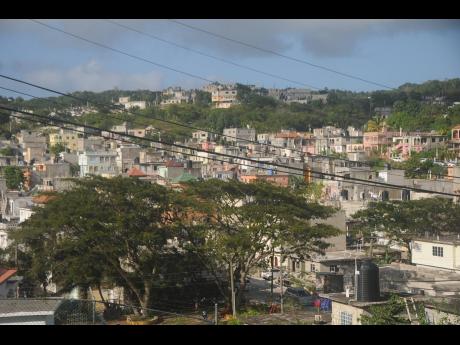Of squatting, tourism and formal housing - Job hunters housing needs spark squatter settlements
Western Bureau:
Armed with the knowledge that it was the need for housing, sparked by the proliferation of new tourism jobs that came to the fore in the 1960s, which gave birth to its city’s numerous informal communities, stakeholders in Montego Bay are wary of being caught off guard again as the tourism and business process outsourcing (BPO) sector begins to churn out new jobs.
In the six decades since the emergence of the city’s 22 unplanned settlements, which have spawned over 30,000 houses, Montego Bay has been locked in a struggle to come to grips with social ills, including crime, which the high level of informality has engendered.
While the early squatters came with good intentions, the fact that they were engaged in the non-paying of utility bills and not contributing to the coffers of the St James Municipal Corporation (StJMC) through the paying of land tax, building tax and other municipal services, they became a drag on the system, especially when some areas became hotbeds of criminality.
In 2006, former Assistant Commissioner of Police Denver Frater described Montego Bay’s informal communities, which included sections of Rose Heights, Green Pond, Canterbury, Mt Salem, Quarrie, Norwood, Bottom Pen, Flankers and Glendevon, as a breeding ground for criminals.
“These areas pose a special challenge to the police, especially at nights. The absence of easy access makes them difficult to police and criminals tend to gravitate towards these areas,” Frater said.
Also in 2006, the StJMC stated that it was losing in excess of $10 million in potential revenue annually because the informal settlements were using its services but not contributing to its revenue stream.
At the time, North West St James Member of Parliament Dr Horace Chang, whose constituency has 19 of the informal settlements, said these areas were creating a major strain on the city’s resources in terms of overcrowded schools, inadequate social services, a growing homeless population, and high unemployment.
“There are no services in the informal settlements in Montego Bay, so everybody crowds downtown ... so it must be overcrowded ... It must be dirty,” Chang said.
While successive governments and private developers have tried, over the past 40 years, to arrest the city’s housing crisis through the development of schemes such as Farm Heights, Cornwall Gardens, Catherine Mount, Catherine Hall, Westgate Hall, Ryne Park, and Cornwall Courts, the informal settlements are still integral to Montego Bay’s housing stock.
Cognisant that housing is not keeping pace with demand, prominent Montego Bay land developer Mark Kerr-Jarrett has had a long history of advocating for the informal settlements to be subdivided and sold to their current occupiers.
In 2000, during his tenure as president of the Montego Bay Chamber of Commerce, Kerr-Jarrett proposed that employer contributions from the National Housing Trust (NHT) be used to regularise the settlements, to include putting in infrastructure. Thereafter, he said the lands should be transferred to the residents for the cost of the infrastructure, plus an administration fee.
“Unless you get people living in a more humane and civilised environment, you are not going to be able to fight crime. Crime thrives in chaos. That is what we have got up there in a lot of these communities,” Kerr-Jarrett said.
“You give people a title ... proper roads ... an address. You put them on the government payroll for taxes and start to formalise the economy, then they are going to now use the legal means to enforce their tenancy,” added Kerr Jarrett.
While some aspects of Kerr-Jarrett’s recommendations have been adopted, such as replacing zinc fencing with concrete walls, creating roads with proper drains, and formalising parcel of lands in some communities, the limited number of affordable housing remains worrisome to stakeholders in the tourism and BPO sectors.
Late last year, the Government announced that Montego Bay was posed to get some 22,000 housing solutions by 2021, via the National Housing Trust and private developers. However, cognisant of the specific needs, Janet Silvera, president of the Montego Bay Chamber of Commerce and Industry, urged that houses be made affordable to young professionals.
“Montego Bay is a strong market with a high demand for affordable homes. However, the cost of acquiring those that are available is a challenge, particularly for our low-income earners and young professionals, who are constantly raising concerns about the severe shortage of affordable homes,” Silvera said.

